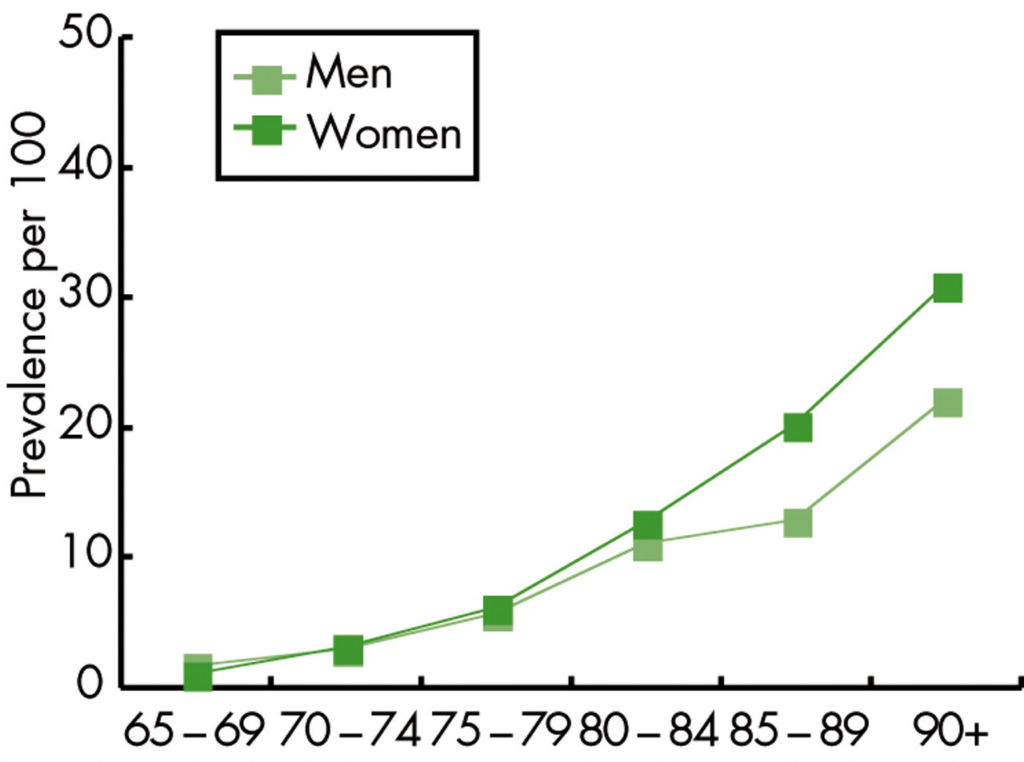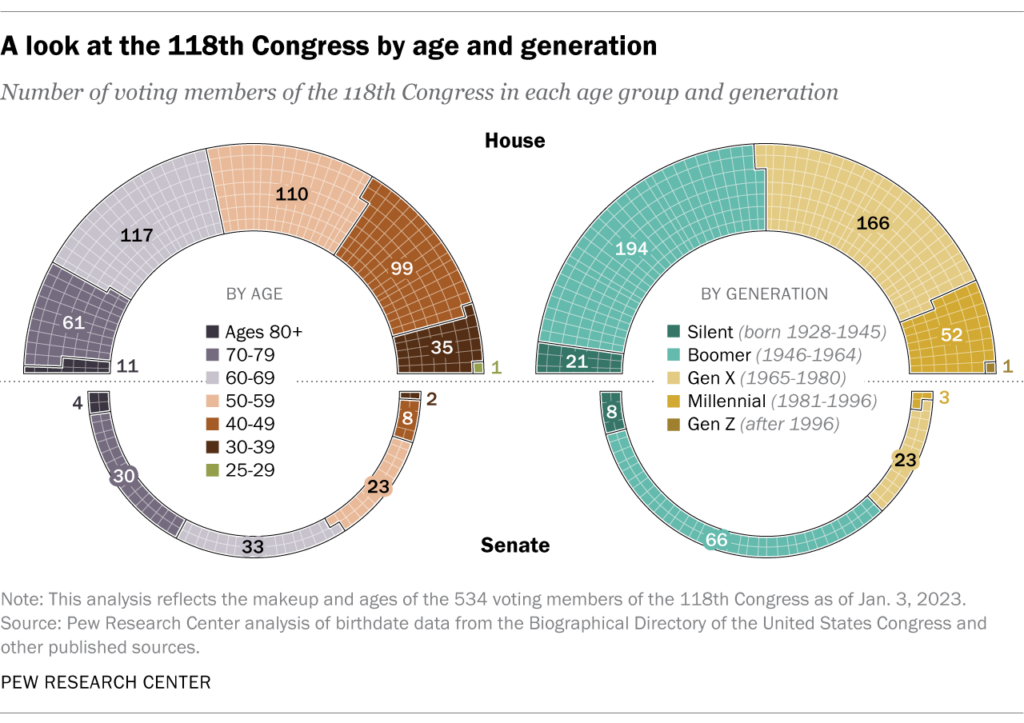Age Limits? (not Term Limits)
It is something we need to think about.

Let me note from the top that this is a difficult subject because it focuses on the inevitability that we all age, and many of us decline in mental capacity as we do. And because these conversations often arise because of specific persons, they can seem insensitive. But there is a broader issue than just specific individuals at stake. Specifically, the functionality of persons who hold public office can have profound impacts on basic democratic quality and/or simply governance as a general matter. It is therefore prudent to consider what general rules ought to be put in place to protect the broader public instead of allowing such decisions to be left up to individuals.
An obvious example of how a lack of such rules can have profound outcomes is the case of Ruth Bader Ginsburg. But, of course, the case that brings me to the keyboard this morning is Senator Dianne Feinstein (D-CA). Feinstein is 89 and will be 90 in June. She was re-elected to the Senate in 2018 for another six-year term.
Let’s turn to the following from Slate: A Brief, Concerning Conversation With Dianne Feinstein.
When the fellow reporter asked her what the response from her colleagues had been like since her return, though, the conversation took an odd turn.
“No, I haven’t been gone,” she said.
OK.
“You should follow the—I haven’t been gone. I’ve been working.”
When asked whether she meant that she’d been working from home, she turned feisty.
“No, I’ve been here. I’ve been voting,” she said. “Please. You either know or don’t know.”
Now, just in case anyone doesn’t understand the significance of the above, Feinstein in fact was gone. She was absent for more than two months. Moreover, this is not the first public mental lapse. James Joyner wrote about this topic over two years ago. If anyone is interested, there is more in a recent episode of The Daily podcast.
So, look, I understand that it is unfortunate (if not a bit gross and uncomfortable) to have to talk about this topic. Aging isn’t pretty and it can take a deep toll on individuals and their families and loved ones. The process of watching my grandfather go through dementia issues over the waning years of his life was not fun. No one wants to go to their grandparent’s home and not be recognized (if not, at times, be accused of coming to rob the place). It is likewise very hard when dementia robs an individual of the ability to make sound decisions about their own care and living circumstances when, at the same time, the law gives them autonomy. It is a cruel catch-22. And while there are mechanisms to change legal status, they can be grueling and expensive.
So, as hard as it might be for a family to have to try and move a loved one out of a home that they own and have full legal control over, but where they can no longer live there safely, how much harder is it to get a sitting US Senator to resign from a seat when they can no longer competently serve?
I am not a gerontologist, so I am not going to go into a deep attempt to analyze that which is outside my area of expertise (thus risking the breaking of the internet). But I do know that age is a major risk factor for dementia and that it starts to increase significantly in the overall population when we reach our 70s, and especially into our 80s. For example, the Alzheimer’s Society notes:
For people aged between 65 and 69, around 2 in every 100 people have dementia. A person’s risk then increases as they age, roughly doubling every five years. This means that, of those aged over 90, around 33 in every 100 people have dementia.
More specifically, note the following graph from a study published in the Journal of Neurology, Neurosurgery & Psychiatry. I would note that this is what most graphs that I saw on this topic look like.

In general, it looks to me like certainly into the 80s the risk of dementia in a powerful person is such that it should give us pause as to whether it is a societal good to run the risk of persons of certain ages being in those positions. We can state that there are mechanisms for assessing competency, but they are rather hard to implement (I mean, is the Senate really going to expel Dianne Feinstein?).
As such, it does not seem unreasonable to have an age ceiling of 80 (but will state that I am not fully set on that number at the moment). I think, at a minimum, it is a conversation worth having. At a bare minimum, there needs to be a better way to deal with the problem of members of Congress who cannot do their duties.
Now, I will note that I do not know of any democracies that have mandatory retirement for elected officials, although most advanced democracies do have upper age limits for judges (see my post Comparative Judiciaries which contains a table from A Different Democracy that is relevant).
And let me note, I am not talking about some blanket mandatory retirement age. I am talking about whether the risks in question warrant conferring substantial power and responsibility don’t warrant a specific situation in which an age limit would be appropriate.
I would note that this is not a hypothetical situation. The current president, and almost certain Democratic nominee in 2024, is 80. His likely Republican opponent is 76.
Here is the age breakdown of the 118th Congress via Pew Research:

But here’s the fundamental question: are the over 39 million residents of the state of California getting appropriate representation from Senator Feinstein?
The answer is manifestly no.
And I am not talking here about whether the Democrats are getting their judges confirmed because of partisan considerations (although judicial confirmations being held up by a single person should be understood to be highly problematic). Rather, I am directly asking whether or not Senator Feinstein can perform a deeply important function within our government. To pick a not inconsequential issue: is she competent to deal with the looming debt crisis issue? Will her health allow her to vote? And if it does, will she be making the decisions, or will her unelected, largely anonymous (for all practical purposes) staff be pulling the strings?
These are consequential questions.
And yes, I think that elections are the best remedy for all these problems, but the reality remains, as I frequently note in various ways, that a combination of weak parties, not especially democratic election processes, and mass behaviors that tend to heavily favor incumbents all combine to make the electoral process less efficacious in this arena than one might like it to be.
Some will, no doubt, suggest that term limits are the answer.
First, this does not address the age issue, as term limits would not restrict or control, in any way, the age of entry into the process. This means that even with term limits, we could end up with someone in the range wherein problems are more likely depending on how old they were when they entered a given office and how many terms they were allowed.
Second, and more importantly, the political science literature is quite clear that term limits do not achieve any of the desired goals that advocates frequently tout, and indeed often create new problems. If one wants a fairly comprehensive rundown of this matter, I recommend political scientist Seth Masket’s post from a couple of years ago, Why Political Science Doesn’t Like Term Limits.
Side note: I know that it keeps being raised as to whether it is sexist to raise this topic about Feinstein when plenty of men have stayed in the Senate well into their 90s. For the record, it was ridiculous for Strom Thurmond to have been in the Senate at age 100. And yes, I think that Chuck Grassley should retire as well. To be honest, while I understand the appeal of power and relevance, I simply don’t understand why people want to be working in their 80s, but I suppose that is its own topic. I will say this: work in your 80s if you like, but you are not entitled to a government office and the commensurate risk to the precious representational role being played for a vast number of citizens. From a purely utilitarian calculation, the pride and self-satisfaction of a single member of Congress should not trump the collective democratic needs of hundreds of thousands (if not, in the case of many Senators, millions) of citizens who have the right to be adequately represented in the legislature.
Let me conclude with the following. The reason I think an age limit rule is worth consideration is that the only way to truly be able to deal with a situation like Senator Feinstein’s is to have a pre-existing, dispassionate mechanism in place (which is, in general, why we have rules of all kinds in the first place). Else, these all become ad hoc and personal, not to mention that the politics of the moment amplify and distort rational choices. If it is known that a given system will, from time to time, have to address difficult circumstances it is better to work out the process in the absence of personal feelings or the emotions of the moment. It is the same basic reason why one should make plans for one’s own old age and potential infirmities, rather than either a) hoping you will be the one who doesn’t have such problems or b) assuming that it will work out at the moment (which is rarely done without some planning).
Update: I meant to also include this Rolling Stone piece: Feinstein’s Health Crisis Goes Back Farther than We Knew.





Interesting. Although there’s no reason to believe the process of trying to make age limits law would be any more “efficacious” than the electoral process.
DiFi looks like death warmed over in that photo. What in god’s name were California voters thinking by sending her back for yet another term? And why didn’t she get shuffled over to a minor committee where she would do as little damage as possible? At times like this I wonder why I bother making monthly donations to the dems.
@Paine: As I keep noting: parties don’t control who runs.
@Paine:
The coda to @Steven L. Taylor: comment is that the failure of other popular Cali Dems to step up and challenge her in 2022 is where the blame should be placed. It is quite possible that Feinstein could have been reelected anyway, due to name recognition, but voters would have had a choice.
This is a bad example. The cause of the crisis is the House Republicans insisting on treating the debt limit differently when there’s a Democrat in the White House. She’s not going to be involved in negotiating with the House Republicans. A better example is her competence to chair the Energy and Water subcommittee. Her state is involved in a deep, ongoing regional water crisis. Her state is part of a region whose implicit long-term approach to electricity in the face of climate change is at odds with FERC and its enabling legislation. She needs to be providing a whole lot of leadership there, and I personally doubt she is, or can.
As you repeatedly pointed out, most (all?) advanced democracies have stronger political parties. Also, in other advanced democracies judges are generally not elected (hence no gatekeeping parties and thus a need for an age limit).
As a rule, political parties don’t want absent or mentally impaired legislators.
So maybe age limits are more of a band-aid that do not really address the underlying problem.
I’m not even sure that introducing age limits would be more feasible than a more fundamental overhaul of the US’ electoral system. People like Feinstein and McConnell (or wannabe Feinsteins) would have to on board…
She was re-elected in 2018, and isn’t running for re-election in 2024.
People age differently. If a 95-year-old still has youthful exuberance and passion, I have no problem with that person continuing to serve. There are 55-year-olds who are far too gone to serve as well.
The best approach is to let the voters decide on a case-by-case basis, but it might also be useful to have a recall mechanism for Congress members so that the voters can basically petition “no confidence” and have a shot at replacing their elected representative.
A kvetch, perhaps age related. Irrelevant to the topic but a pet peeve. The Journal of Neurology, Neurosurgery & Psychiatry couldn’t have used maybe pink and blue, or squares and diamonds, rather than green squares and slightly paler green squares? The point to graphic information is to be … graphic.
That out of the way, I think @drj: is right about the root cause. Maybe you can’t put the toothpaste back in the tube, but it seems to me the weakness of the parties is largely of the parties’ own making. That and our laissez-faire political finance laws, which I believe are also unique. And need correction for multiple reasons.
Re Feinstein, not the general subject of age limits, Anne Laurie at Balloon Juice has, I think, the correct take,
She’s said she’s not running in ’24, in the meantime her vote is necessary to appoint judges, and the GOPs, contra tradition, have made it clear they won’t allow appointment of a replacement to the Judiciary committee.
We’ve spent decades, centuries pushing for the ideal that we evaluate the person and not their physical characteristics. That we evaluate an individuals suitability for a position based on the job requirements and their individual capabilities. And then Diane Feinstein comes along and we say, “let’s put the olds all together as a group and send them out to pasture.” According to your chart, seven out of eight 82 year olds DON’T suffer cognitive impairment, but you deem that 12% risk worth forcing every 82 year old out of public office.
Annual cognitive tests: of course. Blanket bigotry: no.
Would age limits be legal? Well before clinical dementia aging is associated with increasing levels of cognitive dysfunction, but it varies from person to person. We had an age limit for a while until our attorney told us it was not legal. That meant I had to fire or coax into retiring people who were having age induced limitations. Th tissue here is that there is no clear way to fire someone. The voters are likely to not care if they can benefit from seniority if the staff are actually doing the voting.
Steve
Could someone get my post out of jail? Thanks!
@steve:
At least for federal offices, I would say not. Same reasoning as term limits for Congress: no one can impose qualifications beyond those spelled out in the Constitution.
@Michael Cain:
Not at all.
Let’s say we find ourselves in a situation wherein 1 vote is needed to avert a default (a not impossible scenario) and she is too sick to participate?
@Ben:
Thanks for noting the error.
@steve:
@Michael Cain:
The courts have ruled on several occasions that the House and Senate can set requirements for membership, so there isn’t a reason for not attempting to set an age limit. Though we can expect that a lawsuit challenging the age limits to happen. At minimum, they could set limits on committee participation.
@MarkedMan:
While I understand where you are coming from, I reject that term as being the appropriate one.
I think steve’s got it right: it would require a Constitutional amendment to impose age limits on federal elected officials. However, committee assignments are another matter. IMO over age 75 there should be mandatory annual cognitive assessments for all members of Congress which would be used to regulate committee assignments.
Two additional items that really need to be part of this discussion:
1] Feinstein’s membership in Judiciary is re-appointed and re-approved each term. Link to CRS research paper detailing committee selection process, discussed in the first paragraph.
Schumer and the entire D leadership are responsible for this — they’ve known about this and covered for it for years.
2] Who precisely has been doing either the voting or the telling Feinstein how to vote for the past decade? It sure hasn’t been Feinstein herself!
@steve:..That meant I had to fire or coax into retiring people who were having age induced limitations.
Not sure if this is applicable to your situation. At will employment allows termination by an employer for no reason with no notice. It also allows an employee to quit for no reason without giving notice.
@Mister Bluster:
Subject to restrictions on discrimination against members of protected classes. To some degree, older workers are a federally protected class.
@Tony W:
So basically, the solution is, yet again, better voters? And voters more aware of what’s going on with their representatives during off years? Color me skeptical. ;-( (Not that it wouldn’t work, but where are you going to get a different electorate?)
@Steven L. Taylor: (Thanks for getting me out of comment jail!)
Definition of bigotry: “…prejudice against a person or people on the basis of their membership of a particular group”. It may be uncomfortable, but it fits.
@Mister Bluster:
… except for protected classes. Age is a protected class.
@Michael Cain: Whoops, sorry, you beat me to it.
@Ben: @Steven L. Taylor: Well, the last time she spoke on the matter, she said she was not running. Has the window for her to appear on the ballot expired? If not, I’ll wait to see her name absent from the ballot to believe she’s not running. Feel free to consider me an angry old ageist if you wish.
@MarkedMan: Is it bigoted that airline pilots have a mandatory retirement age?
@Steven L. Taylor: Indeed, there are multiple professions that have retirement ages.
@gVOR08:
I am annoyed that the Senate Democrats didn’t even consider carving out an exception to the filibuster for this.
Why the entire Senate even has a role to play in who one party places on a committee is a bit beyond me.
Part of me wants to say no to age limits because people should be able to vote for whatever idiot they want to represent them, however impaired, inept or insane. But then I look at some of the idiots.
If we want to test for competence, we should do so across the board, regardless of age.
And record the testing and make it public, because otherwise it invites the opportunity of abuse. Pull the ultimate decision from the doctors and let them advise, but make removal subject to the same limits as expulsion.
I fear a “AOC is mentally unfit to serve after a Republican chosen doctor evaluated her” scenario.
I could favor tests of logic and statistics as well.
Did someone update the moderation software to be extra prickly? I sometimes use colorful language so I could see it running afoul and that might even be good and fine and proper, but my comment just now had almost no color.
As I under stand at will employment the employer does not state “You are terminated because of your age.”
The employer states “You are terminated”. The employer is not required to give a reason.
If this is the case how does the terminated employee show that they were fired because of their age?
@Mister Bluster:
Generally, the employer is accused of a systematic pattern of behavior. For example, people over 50 are fired at a statistically significant higher rate than people under 50. Or they offer young people retraining but don’t offer it to the oldsters. Only occasionally is the employer dumb enough to tell people, “I’m firing Mike because he’s old.” Years ago the case law was that there didn’t need to be intent, just the statistical pattern. I believe the Supreme Court has tightened that up some.
Mister Bluster- At will does not provide as much freedom as you might think. You still need to document and provide good reasons why you are firing someone. You might not need to tell them why but you need to have stuff documented in case they decide to sue, which happens. I have a pending suit for age discrimination when I and 4 other of our staff were older than the guy. We caught him sleeping at work, he had trouble doing simple stuff that needed help from the mid-levels, he was not a team player and had the most unusual complication I and any of our other senior staff had ever seen that we thought could only result from not paying attention. He had been fired from his prior job for failing to get along with staff but we hired him at the “request” of hospital admin. I knew this was a mistake and documented like heck, but we still get sued.
Steve
@steve: @Michael Cain:
Thank you for the information.
@Steven L. Taylor: Very good question. After thinking about it, I would say yes. I suspect it is a legacy from a different era, and in a field so sensitive people are afraid to muck with it.
@Mister Bluster: in any given year there are many, many civil cases over exactly this. The short answer is a) people who fire someone simply because they are old often mention that to others and b) even otherwise intelligent people still don’t seem to understand that email lingers and is discoverable.
@steve:
in my admittedly limited experience, “at will” is indeed like a D. C. Villains super power but, like those villains, those who use it tend to make fatal mistakes. For instance, they publish employee manuals that clearly spell out workplace expectations. An awful lot of those lawsuits are based on violating a companies own published policies. And they often are such assholes along the way that a jury will be looking for a way to tie it to an actionable offense.
@MarkedMan: I have to admit that feels like doubling down on an iffy application of a term.
It simply isn’t bigotry to acknowledge that, in the main, certain capabilities diminish with age.
Maybe the assessment is incorrect, but bigotry is simply not the right term.
@MarkedMan:..often mention that to others
To paraphrase some guru whose name I forget: “Before you say something, think. Will it improve on the silence?”
@Steven L. Taylor:
Past rhetoric, it’s a complex question.
After giving it some thought and reading up on retirement rules, all I can come up with is: think of it as part of the overall set of rules and procedures to ensure safe operations of commercial aircraft.
Taken all together, they’ve been a success in reducing the absolute number of air accidents, even while aviation keeps growing.
@MarkedMan: Indeed. We had a young(er) director come in and over the next 2 years suddenly all the people over 50 were being asked to leave, fired, or reduced in hours. HR turned a blind eye until someone else sued us (her) over something else and then suddenly when the state realised there was more liability (public university) – she was gone. Sadly the people she got rid of were all too traumatised or decent to sue.
In order to retain their driver’s licence, anyone in my state must pass an annual medical examination once they turn 75. It includes a cognitive test. I understand the limitations on the power of political parties in the US, but could they create over time a norm that candidates for elected office were expected to do likewise at the beginning of a primary once they reached eligibility for social security? It might operate much as the norm does for presidential candidates to release their tax returns; refusing to comply would become a significant political issue.
Of course individuals could try to game the system much like Trump did with his farcical 2016 doctor’s report and his “Woman. Man. Person. Camera. TV.” stunt, but this could be prevented if the relevant party committees nominated (and reimbursed) the professionals who were authorised to do the examinations.
The dementia charts should first be rather taken carefully in respect to simplistic correlation between age and percentage of population as this is area of clear statistical risk of cross correlation of another risk factor, retirement – it is my general understanding that science generally to date supports an understanding that maintenance (or not) of mental activity is a significant impactor on mental decline or not.
That is those who stay mentally active, as in mentally challening activities (work etc) see materially significant positive differences from those who do not with respect to dementia, mental acuity.
Having seen this in my own father, who post retirement went into steep decline after adopting a rather passive lifestyle (having no hobbies nor interests outside of his work), it seems to me that with populations living significantly longer that simplistic age prejudice is real social issue, above that science points to old-fashioned ideas on retirement can materially contribute in themselves to retirees own decline.
However, there needs to be the mechanism to address these cases like Feinstein who clearly is no longer capable – else a Biden who clearly is capable and effective is caught up and the overall credibility of older people remaining active becomes compromised.
Otherwise the part of the response to Mme Feinsteins clear and evident decline lensed through Left identarian politics – “men don’t get such” sort of broad assertion (such things asserted as objective facts, in fact a priori impressions) – shows part of the fundamental dead-end foolishiness of identarian politics. Since the bobo Left rather tends to get itself tied up in overdone virtue signally “sensitivity”
@Steven L. Taylor: of course not, physical performance issues are rather however a different (and generally clearer) subject than mental performance, hard to measure, harder to objectively characterise.
@gVOR08: the weaknesses of your parties by historical development rather appears to have arisen historically from US progressives naivité in respect to popular voting always been a good thing and “more democracy’ always a solution. Thus as I have understood from reading the expansion of the primaries extended into being in a fashion mini-pre-elections.
This then is not the sin of “the parties” but naiveté of 20th century reforms gone wrong. Less ‘democracy’ and more party control (as evidently the primary selection system is badly broken) would be an objective.
Presumably as not coded into your constitutional law this is practically achievable unlike most electoral reforms discussed here.
@Just nutha ignint cracker: In lieu of voters, who would you have adjudicate a person like Feinstein’s suitability for office?
@Tony W: No one. We don’t have structures to establish qualification beyond minimum age, and the voters have the right to elect a dementia-suffering octogenarian if they choose.
And I don’t disapprove of the voters adjudicating this issue; I only note that it doesn’t currently work, obviously, and isn’t likely to improve. But if you have a system in mind for improving the quality of the voters…
I just want to note that, as a California voter, she wasn’t like this in 2018, when she was reelected. This has developed since then. She looks terrible because of the shingles, not because of dementia, which doesn’t have a physical marker. So, there may have been signs of that, but how would a voter know about that?
For pete’s sake, Woodrow Wilson had a stroke when he was president, and they just kind of covered it up.
Yes, she’s a problem now. She wasn’t a problem then.
@Jay L Gischer: This is kind of my point: the possibility of rapid degeneration with advanced age is high. As such, the chance that someone of her age might be unable to do her duty is high.
And while I focused on dementia, the physical issue is part of my concern. The bottom line is that a person of her age is going to be far more likely to be hit hard by illness than a younger person.